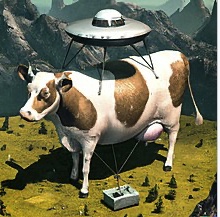Image: 1960’s art of cow getting abducted by UFO in midwest: author Encik Tekateki
Pope Francis’ address to the International Conference organized
by the Centesimus Annus Pro Pontifice Foundation
Clementine Hall = Saturday, 22 June 2024
Let us ask ourselves whether the misuse of this word “INTELLIGENCE”,
so important, so human, is not already a surrender to technocratic power.
Dear Ladies and Gentlemen, Your Eminence, Your Excellencies,
Dear brothers and sisters,
I greet and thank the President, Mrs Anna Maria Tarantola, and I welcome all of you to the annual International Conference of Foundation: Centesimus Annus Pro Pontifice.
This year’s theme is “Artificial Intelligence and the Technocratic Paradigm:
How to Promote the Good of Humanity, The Care for Nature and a World of Peace”.
It is a topic that deserves special attention, because AI has a disruptive influence on the economy and society and can have a negative impact on the quality of life, on relations between people and between countries, on international stability and on our common home.
As you know, I have addressed technological development in the Encyclical Laudato si’, in the Apostolic Exhortation Laudate Deum, and with AI in the Message for this year’s World Day of Peace and in my speech to the G7 a few days ago.
I am gratefi; that Centesimus Annus has given ample space to this topic, involving scholars and experts from different countries and disciplines, analyzing the opportunities and risks associated with the development and use of AI, with a transversal approach and above all with an anthropocentric gaze, and bearing in mind the danger of a strengthening of the technocratic paradigm.
A multidisciplinary analysis is essential to understant all the current and future aspects of AI, the benefits it can bring in terms of productivity and growth, and the risks it can entail, in order to identify the correct ethical ways to develop, use and manage it.
In my message for the last World Day of Peace, I wanted to speak about algorithmics, to point out the absolute necessity of an ethical development of algorithms, in which values guide the paths of new technologies.
In my speech to the G7 I highlighted the critical aspects of artificial intelligence, stressing that it is and must remain a tool in the hands of man. Like other key tools over the millennia, it demonstrates man’s ability to go beyond himself, his “ulteriority”, and to bring about major transformations, both positive and negative. In this second sense, AI could reinforce the technocratic paradigm and the throwaway culture, the gap between developed and developing countries, the delegation to machines of decisions essential to human life. I have therefore reaffirmed the absolute necessity of the development and ethical use of AI, and I have invited politicians to adopt concrete measures to steer the technological process underway towards universal brotherhood and peace.
In this context, your conference contributes to increasing the capacity to grasp the positive aspects of AI and to identify, mitigate and manage the risks, in dialogue with the scientific world, in order to jointly identify the limits to be imposed on innovation when it is to the detriment of humanity.
Stephen Hawking, a well-known cosmologist, physicist and mathematician, said: “The development of full AI could mean the end of the human race… It would take off on its own and redesign itself at an ever-increasing rate. Humans, who are limited by slow biological evolution, could not compete and would be overtaken“ (BBC interview). Is that what we want?
The fundamental question you have asked yourself is this: what is AI for?Does it serve to satisfy the needs of humanity, to improve the well-being and integral development of people, or does it serve to enrich and increase the already high power of the few technological giants despite the dangers to humanity? That is the fundamental question!
The answer depends on many factors and there are several aspects to be studied.
I would like to remind you of some of them, as a stimulus for your further study.
1. The delicate and strategic issue of accountability for decisions made using AI should be explored; this aspect involves various branches of philosophy and law, as well as more specific disciplines.
2. Appropriate incentives and effective regulation must be identified,
on the one hand to stimulate ethical innovation useful for the progress of humanity,
and on the other to prohibit or limit undesirable effects.
3. The entire world of education, training and communication should engage in a coordinated process, to increase knowledge and awareness of the correct use AI and to instil in the new generations, from childhood onwards, a critical capacity towards this tool.
4. The impact of AI on the world of work must be assessed.
I invite the members of the Centesimus Annus Foundation and all those involved in its initiatives to take an active part, in their respective fields, to promote a process of professional retraining and
to urge the adoption of forms to facilitate the redeployment of those made redundant to other activities.
5. The positive and negative effects of AI in the field of security and confidentiality should be carefully examined.
6. The impact on people’s relational, cognitive and behavioral skills, should be considered and researched.
We cannot accept that these capacities should be reduced or conditioned by a technological tool,
that is, by those who own and use it.
7. Finally – and this list is not exhaustive – it is worth mentioning the enormous energy consumption required to develop AI, at a time when humanity is facing a delicate energy transition.
Dear friends, it is on the front line of technological innovation that the future of the economy, of civilization, of humanity itself will be played out.
We must not miss the opportunity to think and act in a new way, with mind, heart and hands, to direct innovation towards a configuration centered on the primacy of human dignity.
This is not a matter for debate.
An innovation that promotes development, well-being and peaceful coexistence and protects the most disadvantaged.
And this requires a regulatory, economic and financial environment that limits the monopoly power of a few and allows development to benefit the whole of humanity.
I therefore hope that Centesimus Annus will continue to address this issue.
I congratulate you on the launch of the second joint research project between the Foundation and the Strategic Alliance of Catholic Research Universities (SACRU) on the theme “Artificial Intelligence and Care for the Common Home: A Focus on Economics, Finance and Communication”, coordinated by Mrs. Tarantola. Please keep me informed!
And I will end with a provocation: are we sure that we want to continue to call “intelligence” what intelligence is not?
It’s a provocation. Let us think about it. Let us ask ourselves whether the misuse of this word, so important, so human, is not already a surrender to technocratic power.
I bless you and wish you well in your activities.
Continue to work courageously, take risks!
And I ask you, please, to pray for me. Thank you very much!


